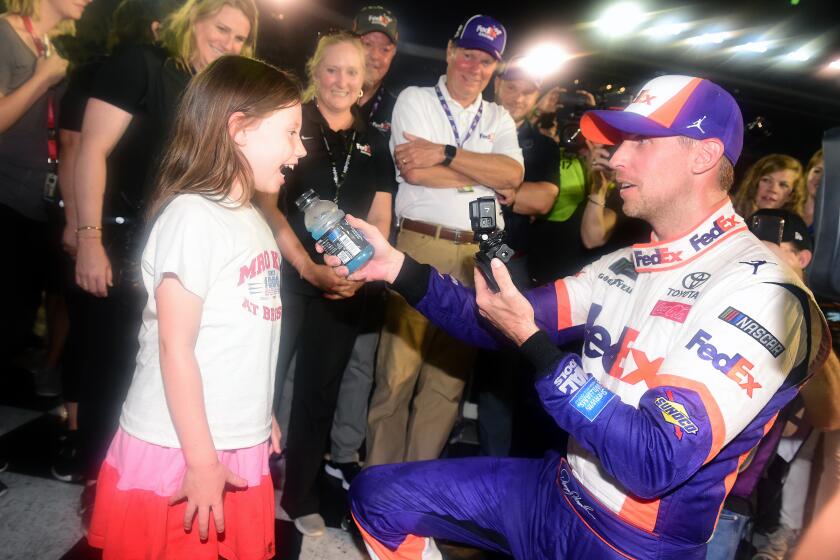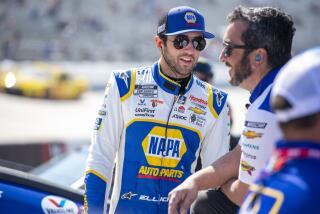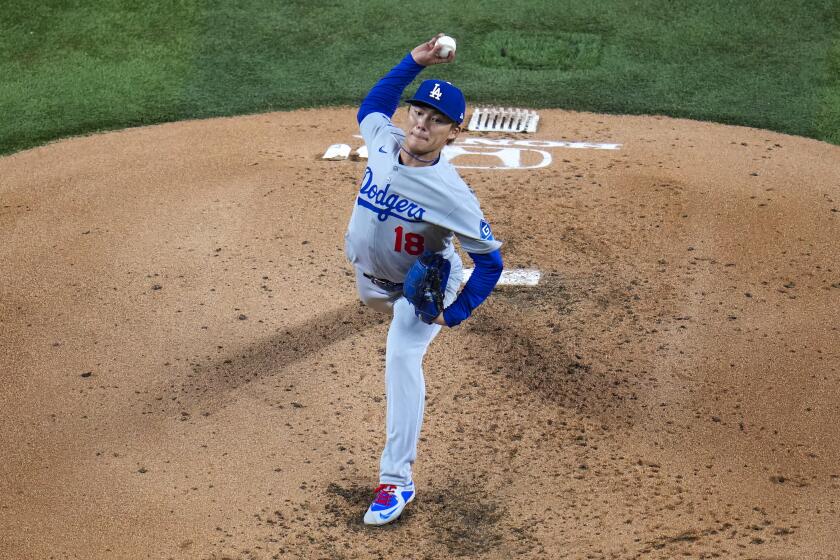NASCAR to continue iRacing events even though real races are back on track
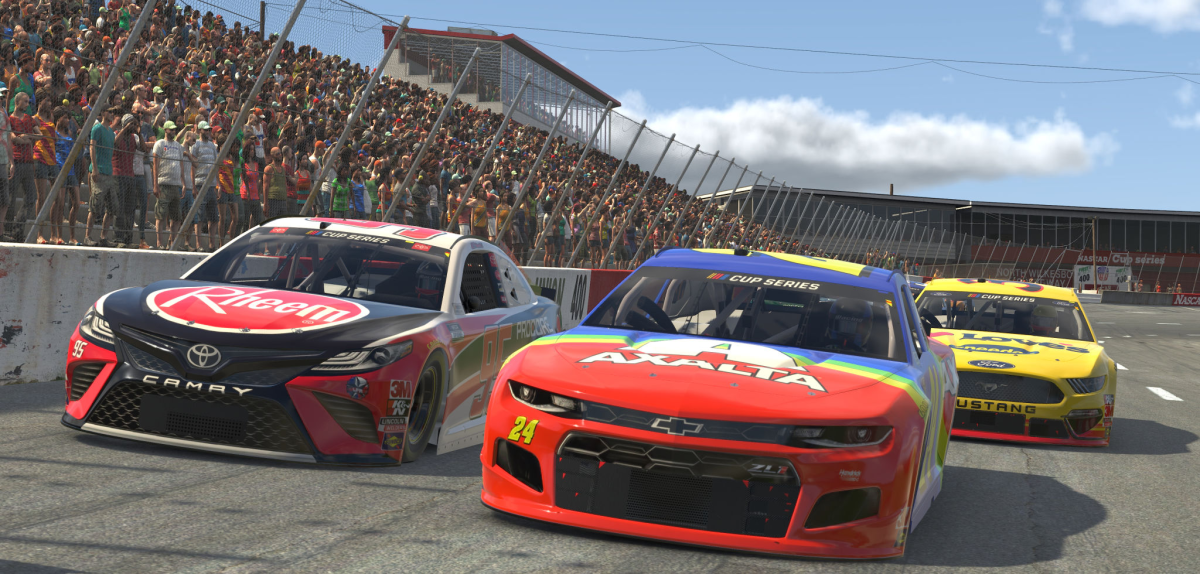
- Share via
Tim Clark began sending out texts before the meeting had even ended.
This was last spring, when like the rest of the sports world NASCAR was forced to suspend its season during the initial wave of the COVID-19 pandemic. As fellow series executives figured out how to halt live races, Clark, NASCAR’s chief digital officer, was already brainstorming about what to do instead.
“While we were in that room, I was having text conversations,” Clark said. One idea that quickly emerged: “Hey, can we pull off an iRacing event?”
The iRacing platform — a high-tech racing simulation game where users compete against one another in real-time, virtual races using a steering wheel, stick shift and foot pedals to control their cars — had long been relevant in the world of NASCAR.
Founded in 2004, it had already attracted hundreds of thousands of customers (the special equipment needed can cost from a few hundred to several thousand dollars). Most NASCAR teams were utilizing the technology as a training tool for their professional drivers. It even helped launch the careers of young NASCAR stars such as William Byron, who became a successful iRacing competitor growing up before he ever set foot in a race car.
“That’s what’s so great about it, how it translates to the real world,” said Steve Myers, iRacing’s executive vice president and executive producer. “Essentially, you’re doing the exact same thing, even down to the same hand and feet movement that you would do in a real race car.”
But the virtual races had never been featured as a television event.
Not until the chaos of NASCAR’s 2020 season created an opportunity.
During the two-month stretch from March to May when real NASCAR races were suspended, the series held “eNASCAR Pro Invitational” events instead — virtual races featuring top NASCAR drivers broadcast by Fox Sports (often in TV slots originally scheduled for canceled real-life races).
The results blew away everyone involved. The first broadcast drew more than 900,000 viewers, almost doubling the previous high mark for an eSports television program. The second shattered that record again, garnering more than 1.3 million viewers. The rest of the six-race schedule averaged around 1 million viewers, as well.
“The expectation was, ‘Let’s get live sports on the air,’ whatever that means during a pandemic when everything was shutting down,” said Brad Zager, Fox Sports’ executive vice president and head of production. “To say it exceeded that would be an understatement.”
This year, NASCAR is bringing the televised iRacing events back, returning with a 10-race schedule that will begin with a Wednesday night race on Fox Sports 1.
No longer are the eNASCAR events a replacement for real-life races. Rather, they’re serving as a complement to the series — a “differentiator,” as Clark called it, that could help the sport build a wider, more engaged audience.
“You’re looking for ways to separate yourself from the pack and create engagement opportunities,” Clark said. “And I think this is one. It’s extraordinarily unique to think of a platform that has applications not only in gaming and eSports but also in real-life racing.”
NASCAR’s iRacing format is an esport broadcast that has the look of a virtual presentation and the feel of something much more substantial.
With NASCAR still operating on a limited schedule this year — most race weekends this season don’t include practice or qualifying days — the idea of holding midweek iRacing events to supplement the calendar was appealing, both to a series trying to boost its TV presence and racing teams looking to woo sponsors.
The first five eNASCAR races this year will be televised on FS1. The final five will be shown by NBC Sports.
“We’re able to use these platforms to engage an audience that may not be engaged with the sport, may not be familiar with the sport, may not be familiar with the drivers,” Clark said. “I think we’re just creating more touch points for those potential fans.”
NASCAR isn’t the only sports organization experimenting with virtual eSports. The NBA sponsors the “NBA 2K League.” The NHL and Major League Baseball both used video games to create digital content during the pandemic shutdown.
But the kind of integration NASCAR can achieve is unique. LeBron James’ physical gifts wouldn’t help him much in an “NBA 2K” video game, nor would Clayton Kershaw’s legendary pitch arsenal be of much use while playing “MLB: The Show.”
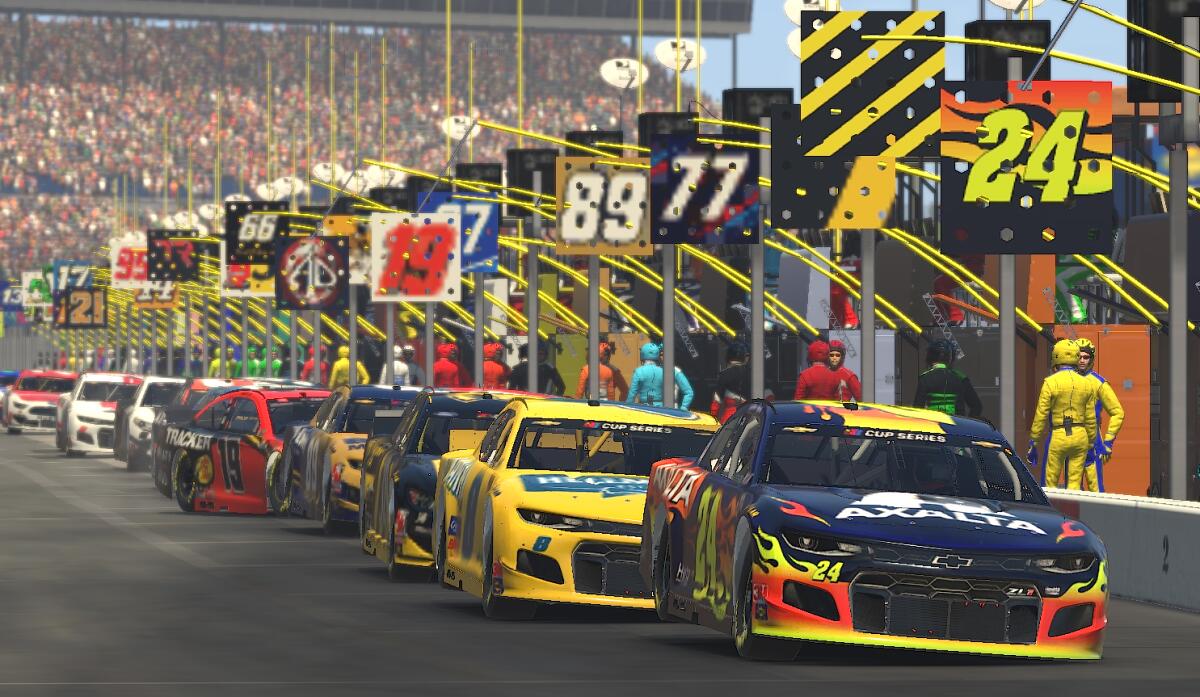
But in auto racing, the skills needed for a simulated race mirror those required inside of an actual car, allowing the sport’s top drivers to participate in serious — albeit less intense — virtual races themselves.
“It’s got a bit of a gaming feel. It’s got a bit of an eSports feel. But it’s also got just enough of the attributes of the real racing product,” Clark said. “Certainly having the drivers involved is critical in that.”
On the broadcast side, Zager said it makes for good TV too. Fox Sports approaches the broadcasts like any other race, holding a prerace show and putting its top commentators on the call. The virtual format enables camera angles that would be impossible in real life. And it gives fans a different forum on which to watch their favorite drivers.
NASCAR driver Denny Hamlin is dealing with challenges working from home. For example, his daughter probably shouldn’t have the remote during iRaces.
“People always want to put it into a bucket of live sports or eSports or whatever it is, but we look for compelling content,” Zager said. “What iRacing was able to provide us, with the combination of how we broadcasted it, and having our announcers, was compelling content.”
And even though organizers hastily planned out last year’s races in a matter of weeks, they don’t feel there are major structural changes needed in this year’s broadcasts. The integration of real-world drivers and virtual races seemed almost seamless. What started out as an experiment is now becoming a strategic long-term endeavor.
“We’d been waiting for this opportunity to showcase on a larger scale what we can do,” Myers said. “They really took a big gamble on us, that we could pull this off. We’re really proud that they’re giving us another chance to do it.”
More to Read
Go beyond the scoreboard
Get the latest on L.A.'s teams in the daily Sports Report newsletter.
You may occasionally receive promotional content from the Los Angeles Times.


